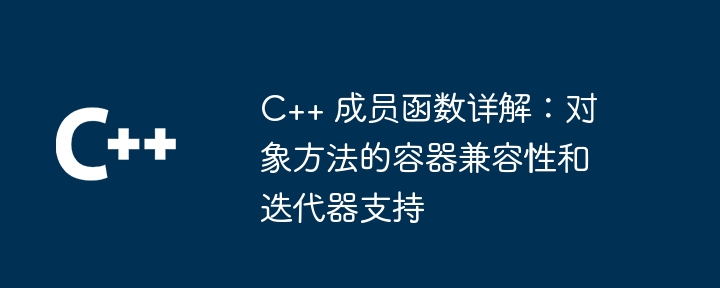Home >Backend Development >C++ >Detailed explanation of C++ member functions: container compatibility and iterator support for object methods
Detailed explanation of C++ member functions: container compatibility and iterator support for object methods
- 王林Original
- 2024-04-29 13:00:021264browse
Member functions are functions defined in the class context and associated with objects, and can access object data and methods. To make it compatible with containers, a custom class must provide assignment operators, equality and inequality operators, and comparison operators. Additionally, to support iterators, classes should provide begin() and end() functions that return iterators to the starting and ending elements of the container, as well as operators that dereference and increment iterators.

Detailed explanation of C member functions: container compatibility and iterator support for object methods
In C, a member function is A special type of function that is defined in the context of a class. Unlike ordinary functions, member functions are associated with an object, which means they have access to that object's data members and methods.
Container Compatibility
The C standard library contains many container classes, such as vector, list and map . These containers can store different types of data, including custom class objects. In order for a custom class object to be compatible with a container, the class must provide specific member functions:
-
#operator=: Assignment operator, used to convert an Object is assigned to another object. -
operator==andoperator! =: Equality and inequality operators, used to compare two objects. Comparison operators such as -
operator<are used to compare two objects according to a specific order.
Iterator support
Iterators are special objects used to traverse containers. In order for a custom class object to support iterators, the class must provide the following member functions:
-
#begin(): Returns a pointer to the first element of the container iterator. -
end(): Returns an iterator pointing to the last element of the container (or an iterator beyond the last element of the container). -
operator: Prefix or postfix increment operator used to move the iterator to the next element. -
operator*: dereference operator, used to obtain the value of the element pointed to by the iterator.
Practical case
Consider the following Date class representing a date:
class Date {
public:
Date(int year, int month, int day) : year(year), month(month), day(day) {}
// ... 其他成员函数
// 容器兼容性
bool operator==(const Date& other) const { return year == other.year && month == other.month && day == other.day; }
bool operator<(const Date& other) const { return (year < other.year) || (year == other.year && month < other.month) || (year == other.year && month == other.month && day < other.day); }
// 迭代器支持
struct Iterator {
Date* date;
Iterator(Date* date) : date(date) {}
Iterator& operator++() { date++; return *this; }
Date& operator*() { return *date; }
};
Iterator begin() { return Iterator(this); }
Iterator end() { return Iterator(this + 1); }
};ThisDate The class implements all necessary member functions to make it compatible with containers and supports iterators. Therefore, we can store Date objects in a container and iterate over them:
// 容器兼容性
vector<Date> dates;
dates.push_back(Date(2023, 1, 1));
dates.push_back(Date(2023, 2, 1));
dates.push_back(Date(2023, 3, 1));
for (auto& date : dates) {
// ... 使用 date 对象
}
// 迭代器支持
for (auto it = dates.begin(); it != dates.end(); ++it) {
// ... 使用 *it 对象
}By implementing the appropriate member functions, we can make our custom class objects compatible with the C standard library's containers Works seamlessly with iterators.
The above is the detailed content of Detailed explanation of C++ member functions: container compatibility and iterator support for object methods. For more information, please follow other related articles on the PHP Chinese website!

